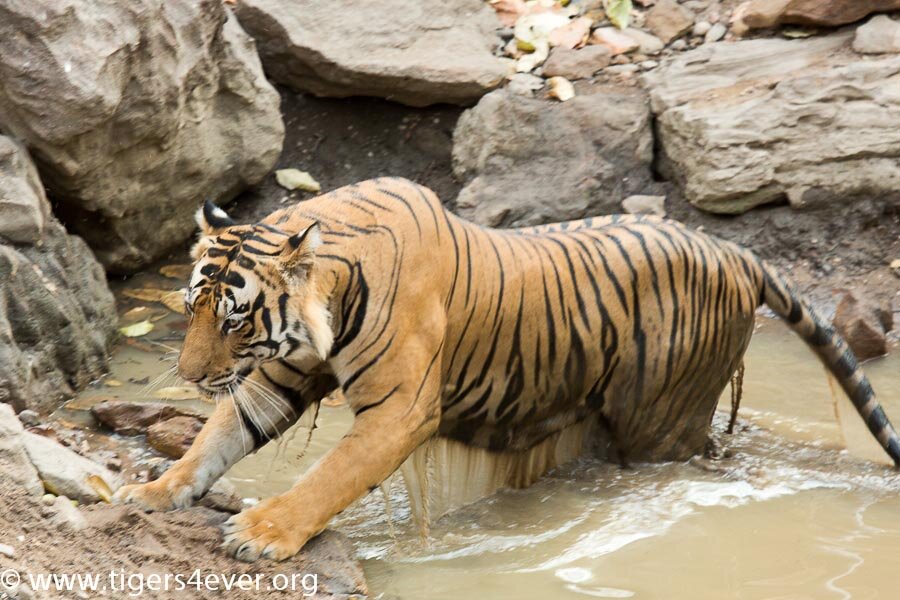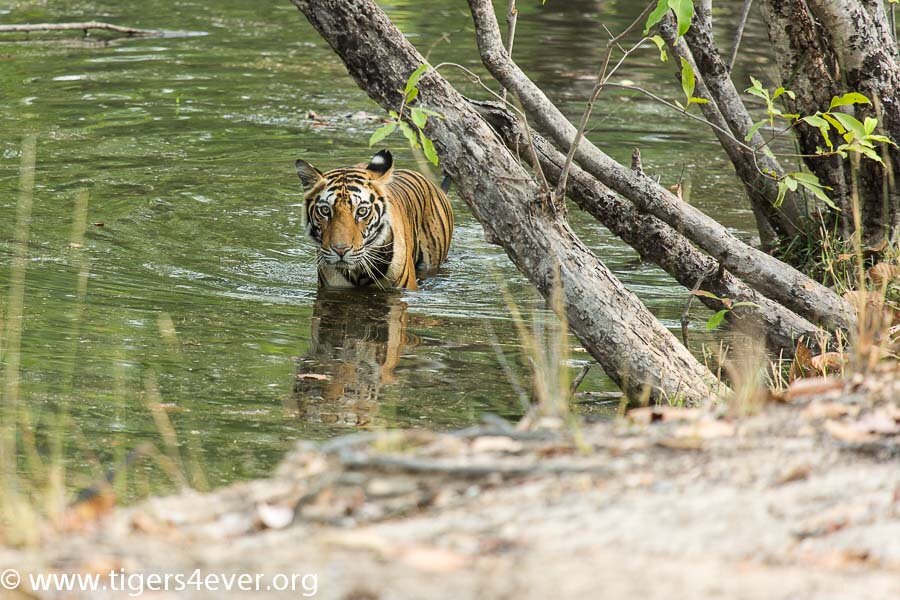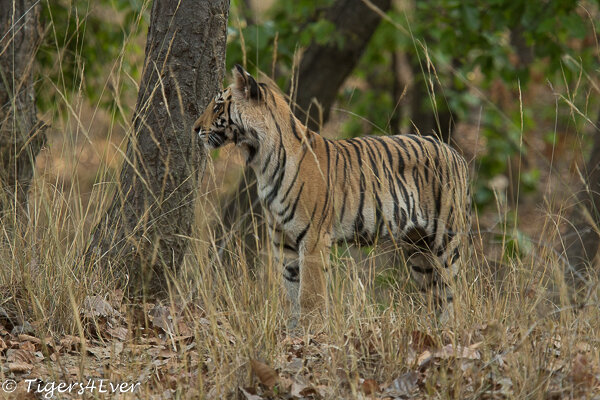By Dr. Corinne Taylor-Smith | Project Leader
Thank you for your incredible support for our Anti-poaching Patrols throughout the last few months. Your generosity has helped us to increase to quadruple-patrolling during the peak poaching monsoon season, and from October we will resume triple-patrolling as the new standard for 2022. Without your help this would be impossible. Your donations help us to ensure that the growing wild tiger and cubs population is getting the best protection we can currently provide.
Stranger Things
It has been the strangest monsoon period since the formation of Tigers4Ever back in June 2010. In fact from a climate perspective 2022 has been a very strange year. The drought season was the longest, lasting well into July this year, which also meant forest fires persisted for longer than usual too. July is usually the wettest month, the paddy fields surrounding Bandhavgarh prepared for the heavy rains and flood waters so vital to produce the rice crops which help to satiate both a domestic and global demand. No rains have meant no rice! The news on NDTV has forecast a global shortage of rice for 2023!
So what has failing rice crops got to do with wild tigers? More than you would imagine, the farming community around Bandhavgarh depends on three major sources of income throughout the year: rice, wheat and milk. When one of these fails, the loss of income has devastating impacts on a rural community, which already loses between 35 -65% of its annual crops to forest dwelling herbivores which raid human food and water resources. When this is coupled with wild elephant raids which can destroy a crop in a night, it becomes clearer to see why human-wildlife conflict poses one of the biggest threats to wild tiger survival.
People can become desperate for replacement income to feed themselves and their families, so they turn to the forest to plunder resources for anything they can eat or sell to survive. Commonly, this is harvesting fruit like mangoes and amla fruit, but there are more sinister elements too. Snare trapping jungle fowl, wild boar, deer, hares and other herbivores to sell or consume the meat, can also lead to predator deaths as unsuspecting tiger cubs and leopards fall foul of these traps. One of the stranger things to happen during this monsoon season has been the cutting down of tendu trees, for wood to sell or burn. Tendu trees are important for the rural community around Bandhavgarh because their leaves are used to make Indian tobacco and are harvested in huge numbers during the first half of the year. Thus cutting down these income providers makes no sense at all.
Another worrying trend this monsoon season has been the encroachment into the core forest to raid bamboo and sand for farming gains. The bamboo has been used to repair or create hedges around the paddy fields to try to prevent wildlife crop raiding, whilst sand has been used to fill the cattle proof trenches surrounding the forest. These cattle proof trenches are there to prevent domestic livestock from grazing in the core forest and to reduce the incidents of livestock (and their owners) being killed by predators including wild tigers. What the culprits don’t seem to understand is when the cattle eat the food in the core forest it increases the likelihood of wild animals raiding the human crops. Thus education plays a huge part of our patrollers’ work.
Something Different
This year we have recruited more volunteers, including some in India, who have helped to distribute education packs to the children in rural villages and to gather new ideas to help educate these children about the importance of wild tigers and their forest home. We will continue to work with our new volunteers to ensure that learning about the forest and the wildlife within it will be fun for the children who will provide the next generation of wild tiger protectors.
We’re also developing a new volunteering partnership which will enable us to create bi-lingual educational resources on forest safety and protection for all age groups, including adults, so that our anti-poaching patrollers can distribute these when patrolling around villages and encountering villagers in the forest. We also hope to develop an audio resource which can be delivered by volunteers in the villages as part of a wider awareness and environmental protection programme.
What Else are we Doing to Help?
Work on our latest project to install two more permanent wildlife waterholes in the Kithauli-Biruhli has been hampered somewhat by the monsoon rains, but we hope to complete this in the next few weeks. On completion, these waterholes will provide year-round water in forest areas usually parched dry by drought before the end of January each year. Once complete, it will bring the total number of Tigers4Ever waterholes to 14. Importantly, these waterholes will help to reduce the pressure on human water resources and thus reduce human-wildlife conflict. Tigers4Ever waterholes already provide year round water for more than two thirds of Bandhavgarh’s wild tigers and their prey. You can read more about our waterholes project here: Two More Waterholes and Something New July 2022 (tigers4ever.org).
After six long and hard years of patrolling, some of the equipment and clothing we provided to help anti-poaching patrols to keep wild tigers safe has started to wear-out and fail. More than 1000 anti-poaching patrollers urgently needed waterproof clothing and boots to protect them during the monsoon rains. Thanks to an urgent appeal and a kind donation from our new corporate partners, the Tiger Chi Community, we have been able to provide waterproof clothing boots and powerful hand-held flashlights for 400 patrollers. We still need funds for a further 600 sets of waterproof clothing and boots (£12150/US$14900), however, with the cooler winter months ahead, we now need your help to provide 1000 warm winter jackets so patrolling can continue on the coldest days and nights. To equip every patroller with a warm winter jacket will cost £20000 (US$25000); we only have sufficient funds to provide 55 warm jackets right now so any help will be most welcome: https://goto.gg/56553. Even the smallest donation will be a huge help in these difficult times.
Patrols on High Alert
With the strange monsoon pattern and its impact on the rural community, our anti-poaching patrollers will need to be on high alert once more as the risk of encroachment and poaching increases again. We know that many poachers who lay the snares and traps are just poor people desperate to feed their families, and they’re not the ring leaders who facilitate the trade in wild tiger body parts nor do they make huge sums from their heinous acts, but their actions still impact the wild tiger population either directly (tigers snared) or indirectly (tigers’ prey snared). Our increased patrolling, which enables us to protect an extra 1000 km (624 miles) per month of wild tiger territory, is vital to avoid wild tiger deaths. Without your support, this would be impossible, so thank you on behalf of the wild tigers we’re keeping safe. If you wish to support our anti-poaching patrols going forward, please donate at: https://goto.gg/28767 as we are now focussing our anti-poaching fundraising efforts on that project going forward.
Making a Difference
Thanks to your continued support, we can cover an extra 1000 km (624 miles) of wild tiger territory per month with our increased patrols. This is vital to ensure sufficient time to search for snares; traps and signs of poisoners around forest areas where human encroachment is widespread; and around the periphery of villages where crop raiding and livestock killing is rife. Increased patrolling helps us to curb human encroachment into wild tigers’ territories, and allows us to provide safety advice for those trying to protect their crops and livestock from wandering elephants and tigers respectively.
With more than 50 tiger cubs born since the start of the pandemic, we have many more wild tigers to keep safe now. So we still need your help. Your gift today, however large or small can make a huge difference as to whether Bandhavgarh’s wild tigers can survive these unprecedented threats:
Making your Gift Count Twice
Your new online monthly gift of £12 (US$16) per month won’t just help us to pay an anti-poaching patroller protecting wild tigers for 35 days per year; it will also qualify for a 100% match bonus on the first donation amount if you keep donating for 4 months or longer. That means when you donate at £12 (US$16) monthly in month 4 we will receive an extra £12 (US$16) from GlobalGiving to help us save wild tigers. Thus there has never been a better time to start a new monthly donation than now. (https://www.globalgiving.org/projects/saving-bandhavgarhs-wild-tigers/?show=recurring).
Without our help, we know that more wild tigers will die; and more humans will be mauled or killed due to encroachment or human-tiger conflict. Sadly, with every human life lost comes another threat to the wild tiger’s survival in the form of retaliation; thus we must protect both if we are to ensure that wild tigers can have a wild future.
Please don’t hesitate if you can help, your donation can be the difference between life and death for a wild tiger, as it helps to increase our patrolling when it is most needed. Every tiger and every tiger cub counts. Thank you for making our fight against poachers, the changing climate and human-animal conflict possible. (https://goto.gg/28767).
Links:
Project reports on GlobalGiving are posted directly to globalgiving.org by Project Leaders as they are completed, generally every 3-4 months. To protect the integrity of these documents, GlobalGiving does not alter them; therefore you may find some language or formatting issues.
If you donate to this project or have donated to this project, you can receive an email when this project posts a report. You can also subscribe for reports without donating.
Support this important cause by creating a personalized fundraising page.
Start a Fundraiser

